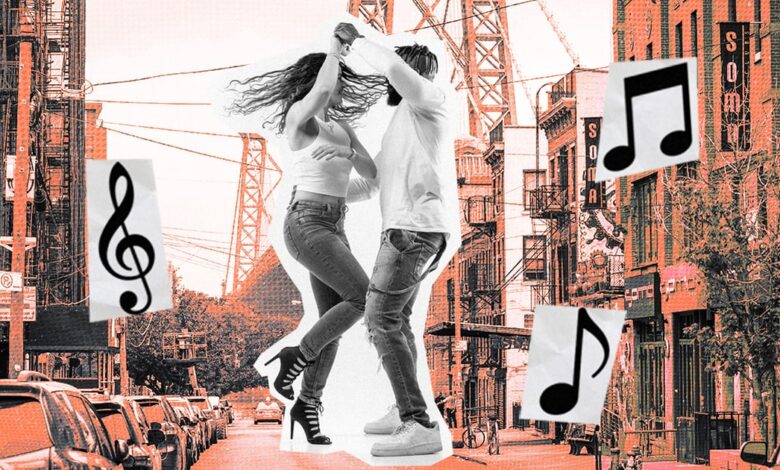History of Summer Latin Dance Night in NYC 2024

:upscale()/2024/07/10/840/n/1922283/tmp_8cHqNA_015a0ea81a2c18af_CollageDancersInNYC_Main.jpg)
:upscale()/2024/07/10/840/n/1922283/tmp_8cHqNA_015a0ea81a2c18af_CollageDancersInNYC_Main.jpg)
Ask anyone in New York, and they’ll tell you that summers in the city are special. So special that they’ve been immortalized in great literature, film, and song for decades now. Perhaps the most famous Latino, El Gran Combo’s “Un Verano En Nueva York” is an ode to New York City summers and everything they have to offer: street festivals, block parties, boat tours, days at the beach. And for many Latinos in the city, summers mark the return of a long-standing tradition: Latin dance nights.
When I was a kid, my dad used to take my sister and I over on the weekends, and he would take us down to the South Street Seaport for salsa music at night. This was before the recent renovations, when Fulton Fish Market still operates out of downtown, filling the air with the heady scent of tilapia, salmon, and sea bass. But as you get closer to the water, the scent dissipates and the clave beats become stronger. You’ll pass Pizzeria Uno and the now-shuttered Sequoia bar, turn a corner, and boom, a dance floor packed with NYC’s best moves, the bass thick enough to swim through.
These parties play a vital role in maintaining culture, language and political power that we have seen eroded as rents have skyrocketed.
Those Latin dance nights were a formative part of my childhood. Not because I learned to dance there (I still haven’t), but because of the community experience they provided, the Latinidad that surrounded you as you walked in. It was like a big family, where faces you hadn’t seen in years would pop up and separate themselves from the crowd. I’m still on good terms with all of my dad’s friends (who are now in their 60s) thanks to those Latin dance nights. I still remember so many times when my parents—who were separated for years at the time—would run into each other at an event or party, and the more difficult aspects of their relationship would be forgotten as they played a song or two.
But this summer, instead of reliving those fond memories, I plan to create my own and attend as many Latin dance nights as possible. Toñitas 50th Anniversary Party in June is a sight to behold. Amid the collision of boutique restaurants and three-story brick buildings in South Williamsburg, Grand Street is packed with twirling bodies swaying to the rhythms of salsa and reggaeton. Vendors from across the city, such as La Fondaserves Puerto Rican staples, while others offer classic Caribbean drinks like coco frio; DJs and live bands play in the background. It’s a day that feels like you’re in old New York City.
But while Toñitas is a legitimate throwback, two other organizations, Perreo 2 the People and La 704, have been hard at work trying to bring Puerto Rico’s futuristic sound to the Big Apple. Twice in as many months, the collectives have hosted perreo parties at Starr Bar in Bushwick, showcasing the island’s next generation of talent. Not only is it a platform for emerging artists like The BendicionTaiana, KeyAnd Enyel CThe parties also act as a bridge between the overseas Vietnamese community and the homeland. At the time Puerto Ricans are disappearing from the city we helped buildThese parties are a vital part of maintaining the culture, language, and political power that we have seen eroded as rents have skyrocketed. And for me, they represent a kind of homecoming.
I was a color expert for years now, weathering the ups and downs of the corporate world. As I did, I found that new environments and opportunities opened up for me, taking me far from my concrete beginnings. Working in tech meant nights filled with craft beer, ping pong, and karaoke. Advertising led me to the snowy streets of Buffalo, where decades-old pubs and upscale restaurants mingle on Main Street. But the more I became immersed in corporate culture and sought out different experiences, the more I drifted away from the low-key Latino parties that had nourished me as a young adult. We didn’t need much to have fun, no fancy liquor or fancy appetizers. We just needed a beat and a dance floor.
Now that I am older and wiser, I am looking forward to going back to my roots, giving back to the community, and reclaiming a part of myself that I have kept hidden for so long. And maybe I will finally become the salsa dancer I have always wanted to be.
Miguel Machado is a journalist with expertise in the intersection of Latino identity and culture. He does everything from exclusive interviews with Latino music artists to opinion pieces on community-related issues, personal essays tied to his Latinidad, and in-depth articles and features related to Puerto Rico and Puerto Rican culture.



